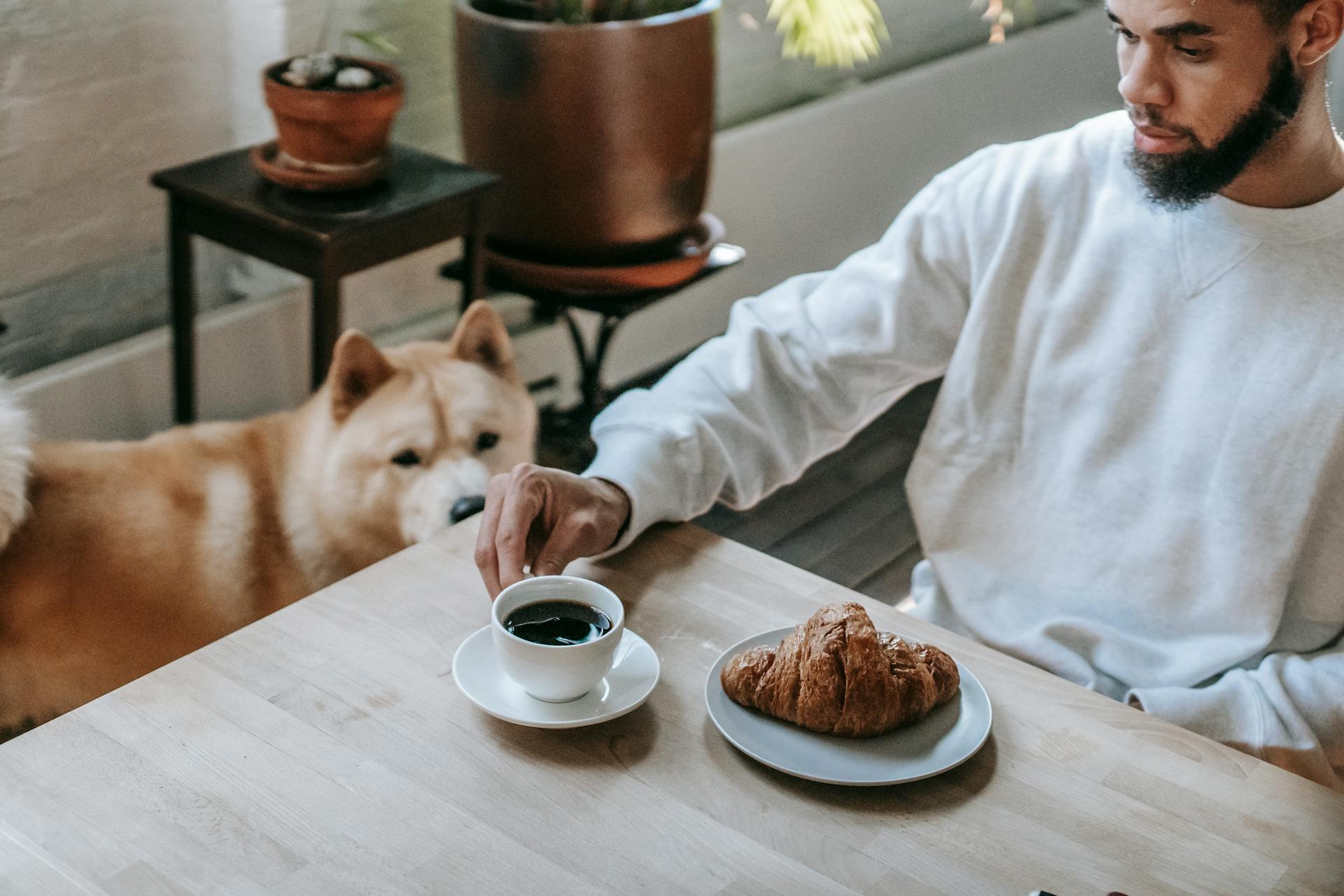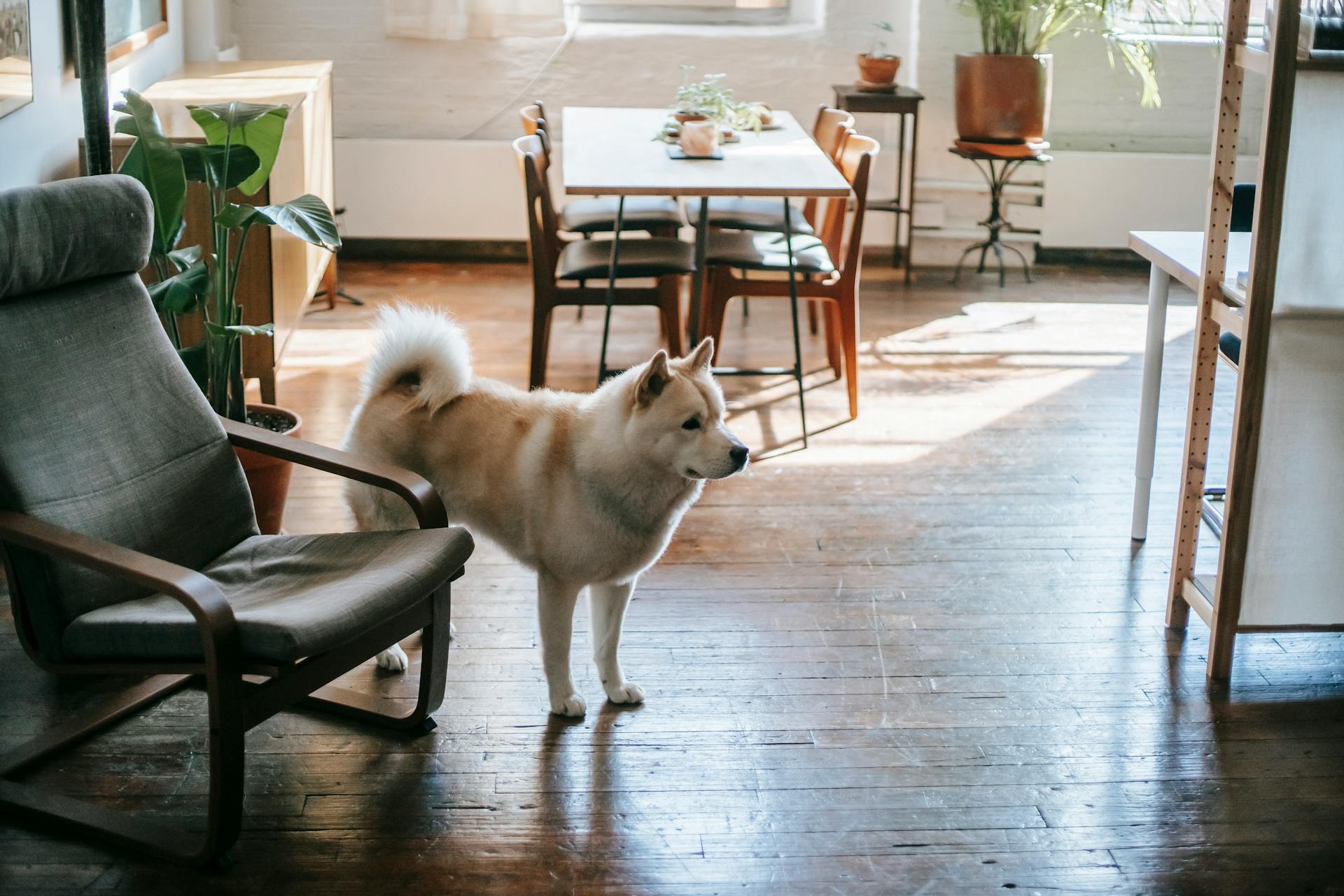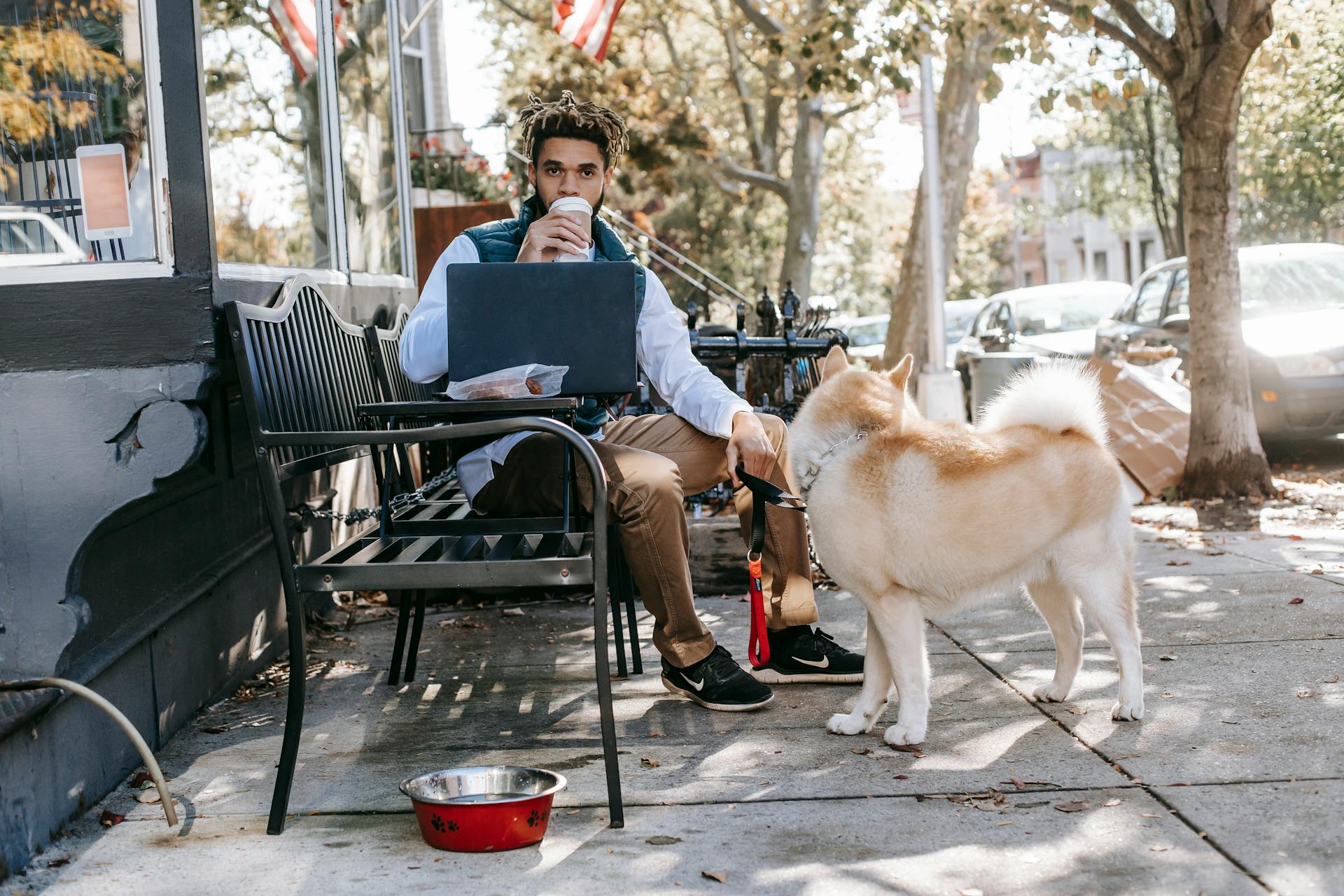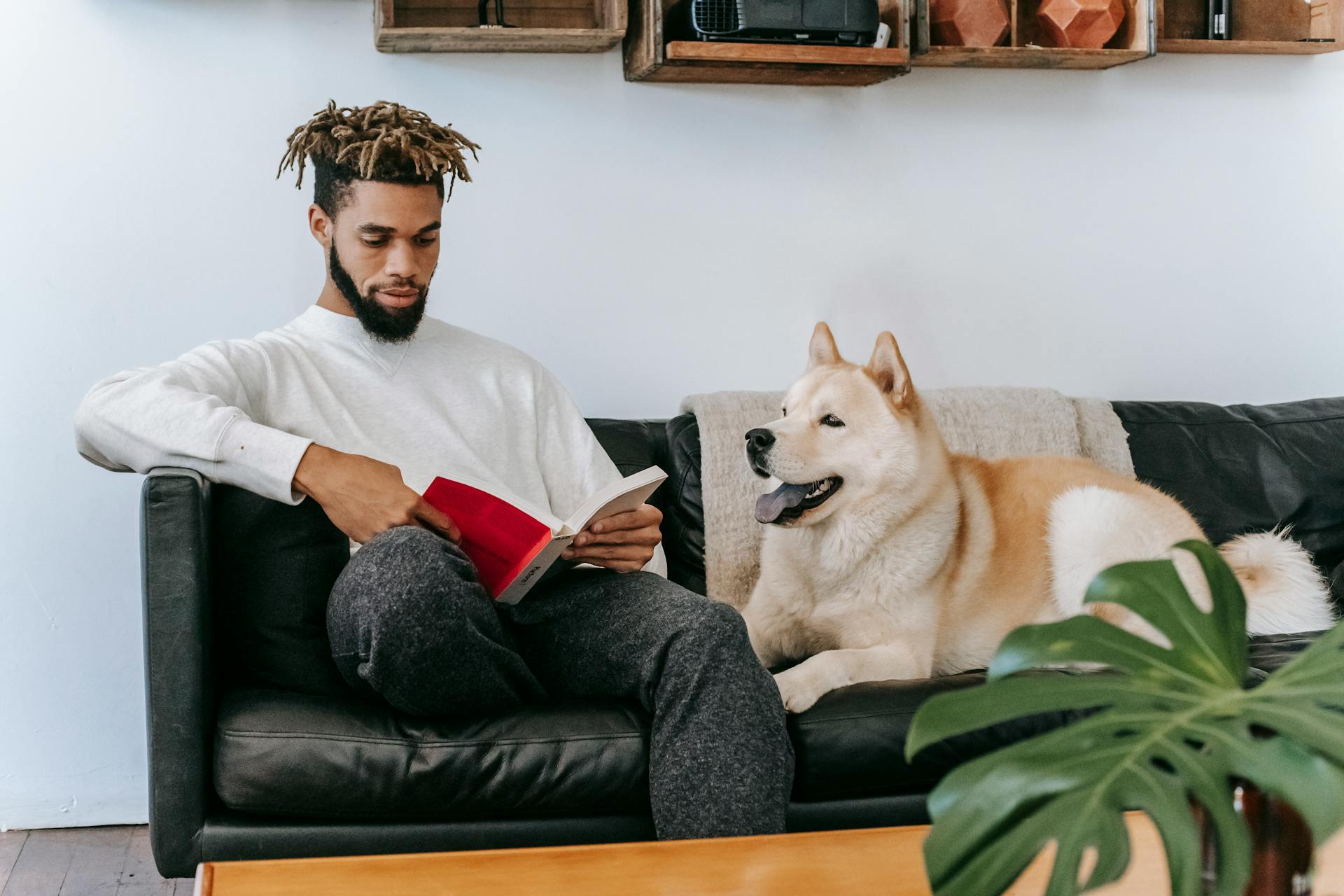
Akitas are a breed of dog known for their loyalty and protective instincts, making them a popular choice as guard dogs. They have a strong prey drive and are naturally suspicious of strangers.
Their origins as a hunting dog in Japan have instilled in them a strong sense of alertness and vigilance. This makes them well-suited to detecting potential threats.
Akitas are not generally aggressive, but they will defend their family and territory if necessary. Their loyalty to their family is unwavering.
Their large size, weighing between 70-130 pounds, can be intimidating to potential intruders. This, combined with their loud bark, can be an effective deterrent.
Readers also liked: Are Akitas Good with Kids
Why Akitas Make Good Guard Dogs
Akitas are large and powerful dogs, standing between 24 to 28 inches tall at the shoulder and weighing anywhere from 70 to 130 pounds. Their robust build, strong jaws, and thick double coat give them a formidable presence that can serve as a deterrent to potential intruders.
Their striking appearance alone is enough to make them a good guard dog. Akitas are fearless and confident, making them unflinching in the face of potential threats. They are not easily intimidated and will stand their ground when confronted.
Akitas are not overly aggressive by nature, but they will display aggression if provoked or if they sense a genuine threat. Their protective instincts are well-balanced, and they typically do not display aggression unless provoked. This controlled demeanor makes them reliable and discerning guard dogs.
With proper training, socialization, and care, an Akita can fulfill their role as a guard dog with unwavering devotion and courage. Akitas are loyal and loving companions, and with responsible ownership, they can become cherished members of your family.
Curious to learn more? Check out: Akitas Good Service Dogs
Understanding the Akita Breed
The Akita breed has a rich history that's essential to understanding their natural protective instincts. Originating in Japan, Akitas were bred for noble purposes, serving as hunters of large game and eventually as guard dogs for Japanese royalty and nobility.
Akitas are naturally inclined to guard and defend, and this is due in part to their historical background. They were revered as symbols of strength, loyalty, and courage, and this has had a lasting impact on their temperament.
Early training and socialization are crucial to shaping an Akita's guarding potential, and this should start as early as possible. Proper training and socialization help ensure their behavior is controlled and appropriate, and this is especially important for their natural protective instincts.
Here are some key characteristics of Akitas as guard dogs:
The Akita: A Warrior's Heritage
Akitas have an impressive lineage that dates back centuries, originating in Japan where they were bred for noble purposes, serving as hunters of large game such as bears, boars, and deer.
Their utility expanded to include guarding properties and defending their owners, making them naturally inclined to guard and defend. This historical background has had a profound impact on the breed's temperament and protective instincts.
Akitas were revered as symbols of strength, loyalty, and courage, often bestowed with the responsibility of protecting Japanese royalty and nobility.
Their rich history has shaped the breed into the loyal and protective companions they are today.
Akitas have a natural inclination to defend their territory and will do so with determination, making them formidable opponents when it comes to confronting potential intruders.
Here are some key facts about the Akita breed:
Akitas are not inherently aggressive, but they can become protective when necessary, making proper training and socialization essential to ensure their behavior is controlled and appropriate.
Genetic Predispositions
The Akita breed is prone to certain genetic health issues, including hip dysplasia, which can lead to arthritis and mobility problems.
Hip dysplasia is a common issue in Akitas, with many dogs requiring surgery to alleviate pain and improve mobility.
Akitas are also at risk for subvalvular aortic stenosis, a heart condition that can lead to heart failure.
This heart condition can be detected through a series of tests, including an echocardiogram and a cardiac exam.
Some Akitas may also be prone to certain cancers, such as lymphoma and mast cell tumors.
Responsible breeding practices can help minimize the risk of these genetic health issues in Akitas.
Additional reading: Bernese Mountain Dog Issues
Akita Temperament and Behavior
Akitas are fearless and confident dogs, making them unflinching in the face of potential threats. They are not easily intimidated and will stand their ground when confronted.
Their protective instincts are well-balanced, and they typically do not display aggression unless provoked or if they sense a genuine threat. This controlled demeanor makes them reliable and discerning guard dogs.
Akitas are naturally protective, but proper training and socialization are essential to channel their guarding potential effectively. Early socialization with different people, animals, and environments is crucial to ensure they can distinguish between genuine threats and non-threats.
Proper obedience training is also essential to ensure they respond to commands reliably. A well-trained Akita is more likely to exhibit the appropriate protective behaviors without becoming overly aggressive.
Here's a summary of key Akita temperament traits:
Akitas are generally good with children and often take on a protective role towards them. However, supervision is important due to their size and strength.
Protecting Your Home with an Akita
Akitas are naturally protective dogs, but they need proper training and socialization to maximize their potential as guard dogs.
Early socialization with different people, animals, and environments is crucial to ensure that Akitas can distinguish between genuine threats and non-threats. This helps them develop good judgment and prevents them from becoming overly aggressive.
Proper obedience training is essential to ensure that Akitas respond to commands reliably. A well-trained Akita is more likely to exhibit the appropriate protective behaviors without becoming overly aggressive.
Akitas are generally good with children and often take on a protective role towards them, but supervision is important due to their size and strength.
Here are some key things to keep in mind when protecting your home with an Akita:
Akitas are willing to take action when necessary, and their loyalty to their owners drives them to protect their homes and loved ones with dedication. They have a natural inclination to defend their territory and will do so with determination.
With early training and socialization, starting as puppies, is ideal to shape an Akita's guarding potential and ensure they are well-behaved protectors.
Akita Care and Maintenance
Akitas have a double coat that requires regular grooming to prevent matting. They need to be brushed several times a week, especially during shedding season.
Proper nutrition and routine veterinary care are essential to keep your Akita healthy and effective as a guard dog. Akitas can adapt to apartment living, but they do require regular exercise and mental stimulation.
Akitas are generally good with children and often take on a protective role towards them, but supervision is crucial due to their size and strength. Early training and socialization, starting as puppies, is ideal to shape an Akita's guarding potential and ensure they are well-behaved protectors.
Akitas can live peacefully with other pets if they are socialized early, but supervision is crucial, especially with smaller animals, due to their prey drive. Regular exercise and mental stimulation can help prevent boredom and destructive behavior.
Here are some essential care and maintenance tasks for your Akita:
- Brush their coat several times a week
- Provide regular exercise and mental stimulation
- Ensure proper nutrition and routine veterinary care
- Supervise interactions with children and other pets
- Provide early training and socialization
Frequently Asked Questions
Can an Akita beat a German Shepherd?
While an Akita may have a lower biting risk, its powerful jaws can deliver a more damaging bite. In a hypothetical confrontation, the Akita's bite force might give it an edge over the German Shepherd.
Featured Images: pexels.com


